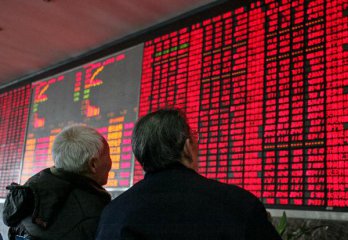
Chinese bonds haven’t done this well relative to equities since the stock market bubble burst in 2015, and it looks like the outperformance will continue.
Signs of slowing economic growth and uncertainty over how a trade spat with the U.S. will pan out are buoying demand for debt and weighing on stocks, while there’s plenty of liquidity and the deleveraging that undermined the bond market last year has faded. That’s driven the yield on 10-year government bonds down 17 basis points this year, as the Shanghai Composite Index slid 3 percent.
“The selloff of big caps will likely get worse in the second quarter, with exchange traded funds facing stronger redemption pressures,” said Hao Hong, chief strategist at Bocom International Holdings Co. “It makes more sense for investors to buy bonds rather than stocks, especially now that the risk of higher inflation is muted.”
China’s so-called great ball of money tends to cause trading frenzies as it rolls among assets such as stocks, wealth-management products and real estate. Policymakers are likely to welcome bonds now being in favor, as they’ve been trying to lure foreign investors onshore in a push to internationalize the yuan. It’s a balancing act, though, as a slide in stocks could quickly accelerate, threatening to overshadow inclusion into MSCI Inc. gauges in June.
“There’s still a lot of uncertainty ahead,” said Ming Ming, head of fixed-income research at Citic Securities Co. in Beijing. “The sure thing is the volatility of bond yields will increase amid the trade tension as well as the deleveraging drive.”
Changing Fortunes
Dumping stocks for bonds would’ve seemed a contrarian trade at the end of 2017, when sovereign notes had their biggest plunge in four years as China campaigned to curtail excessive borrowing. But the tables turned in the first quarter, the worst for the Shanghai equity benchmark and the best for 10-year government bonds in at least two years. The last time moves in the securities diverged so much was in the third quarter 2015.
While China will continue tightening, the impact won’t be as intense this year because investors are more prepared and familiar with the process, while authorities will anyway want to keep liquidity loose enough to avoid violent market moves, said Meng Xiangjuan, head of fixed-income research at SWS Research in Shanghai.
The benchmark seven-day repurchase rate dropped to a one-year low this month amid plentiful liquidity. March inflation data came in lower than expected Wednesday, with the consumer price index retreating from a four-year high and the gauge for producer prices rising the least since October 2016.
Stocks Downturn
While shares have rebounded this week as Beijing and Washington seemed to strike a more conciliatory tone, the trade dispute could drag on and hurt risk appetite, said Liu Dongliang, a senior analyst at China Merchants Bank Co. in Shenzhen. On Tuesday, Morgan Stanley cut its target for Chinese equities, saying the CSI 300 Index was unlikely to get near its January high again this year.
Some bears remain in the bond market, with Deutsche Bank AG saying Chinese government debt has become too expensive. But bulls have momentum on their side. SWS’s Meng is among those who think the rally has further to run, forecasting the 10-year yield could drop to as low as 3.4 percent. The yield was at 3.73 percent on Wednesday.
“Investing in bonds would be a better idea than buying stocks throughout this year,” she said. “A slowing economy and global uncertainty will keep weighing on equities, while these factors will keep benefiting debt.”




















Latest comments